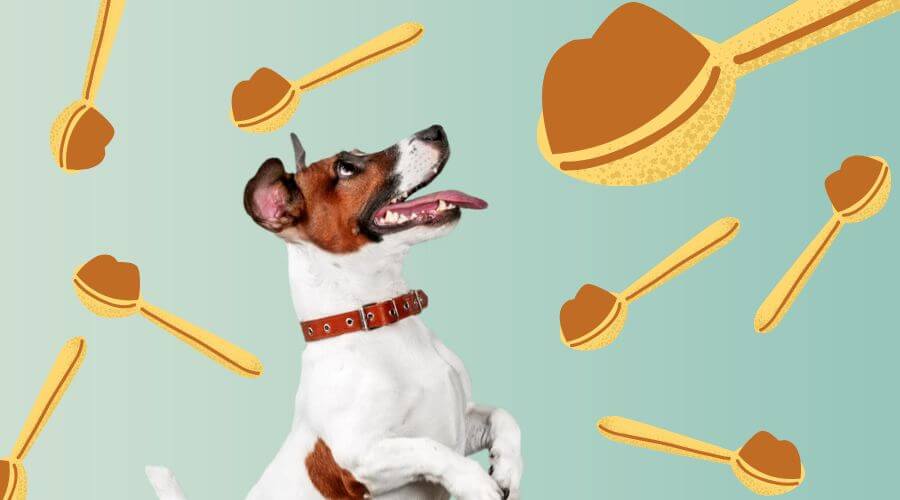Key Takeaways
- Almond butter is a light brown paste with a slightly sweet and nutty taste, made by grinding almonds.
- Almond butter contains more monounsaturated fats than other nut butters, making it healthier for dogs to consume.
- Can dogs eat almond butter? Yes they can! 🐶😃
- Health benefits for dogs include: protein for muscle growth, healthy fats for a shiny coat, vitamins, and minerals to boost the immune system, calcium, and potassium for strong bones and muscles, fiber for a healthy digestive system.
- Risks of feeding your dog almond butter include: weight gain from the high fat content, health problems from too much protein or calories.
Like other nut butters, almond butter is obtained by grinding the roasted nuts. The oils in the nut are released, and it is usually ground to a smooth paste, although some people like to have it with bits of almond still in it. It’s characterized by a light brown color, a slightly sweet and nutty taste, and an oily feel.
Almond butter contains more monounsaturated fats than other nut butters (about 49% vs 31-37% for peanut butter), and because of this it has a longer shelf life. Almond butter also doesn’t need to be refrigerated like peanut butter does, since the monounsaturated fats make it more resistant to going rancid. But can dogs eat almond butter? Let’s find out!
Health Benefits of Almond Butter for Dogs
Can dogs eat almond butter? First, let’s consider all the health benefits:
- Not only does almond butter provide your pup with protein for building and repairing muscles, but it also has good fats which bolster skin health and energy levels.
- Its vitamins (including vitamin E) & minerals will help strengthen their immune system, while calcium & potassium build strong bones and muscles.
- What’s more, its fiber benefits digestion, making sure diabetes is kept in check as well.

Risks of Feeding Your Dog Almond Butter
Can dogs eat almond butter? It’s generally safe for dogs, but there are several dangers in giving your dog this delicious nut butter:
- Almond butter has a lot of fat, to start. This means it should be administered to dogs sparingly. Dogs who consume too much fat may become overweight and develop conditions like pancreatitis.
- Also, almond butter has a lot of protein. This may be advantageous since dogs’ health depends on protein. Yet, consuming too much can also result in issues including liver and renal damage.
- Thirdly, almond butter contains a lot of calories. It’s not necessarily a bad thing, but you should be aware of it if you’re attempting to control your dog’s weight.
- Check the contents list before purchasing an almond butter because certain brands may contain additives like xylitol, salt, or sugar that are harmful to dogs. Dogs who consume xylitol may get convulsions, tremors, vomiting, and diarrhea. You should take your dog to the vet right away if they consume almond butter that contains xylitol.
How Much Almond Butter Is Too Much?
Can dogs eat almond butter? Yes, but how much? When it comes to almond butter, moderation is key. Too much of this food can be harmful for dogs due to its high fat and calorie content. The appropriate amount of almond butter will vary depending on your dog’s size and weight, so it’s important to consult with your veterinarian before giving your pup this food.
Generally speaking, a tablespoon or two of almond butter per day is a safe amount for most dogs. Remember that excessive amounts of almond butter can lead to weight gain, pancreatitis, and other health problems.
Editor’s Note
My dog absolutely loves almond butter, but since it’s high in fat and calories I try to limit her intake. In order to keep her healthy, I give her plain almond butter and pair it with other nutritious foods like fruits and veggies. Dipping celery or carrot in almond butter is one of her favorite snacks!
How to Make Almond Butter at Home for Your Dog?
Forgo the store-bought almond butter and make your own with a few simple steps! Roast some almonds in a skillet until lightly browned, then grind them down to desired consistency. You could even sweeten it up by adding honey or another type of natural sweetener for extra flavor. Store this delicious treat in an airtight container in the fridge – it will last several weeks, so you can share its sweetness often! Make mealtime more exciting for your pup and try dipping their favorite dog treats into homemade nutty goodness!

Can Dogs Eat Almond Butter? It’s Time for a Conclusion
So, can dogs eat almond butter? In conclusion, dogs can eat almond butter, but it should be given in moderation due to its high fat and calorie content. It may seem like a tasty, healthy treat for them, as it provides protein, fats and essential vitamins and minerals, but too much could cause harm to their health. If you’re considering treating your furry friend to some almond butter, check with the vet first! And always double-check labels before making purchases so there are never any surprises at snack time!
Nut Butter & Dogs: Frequently Asked Questions
Is Almond Butter Better Than Peanut Butter for Dogs?
Fur babies everywhere can rejoice – almond butter has arrived! A scrumptious and nutritious alternative to traditional peanut butter, this treat is chock full of vitamins, minerals and healthy fats that will help keep your pup feeling energized for the day. And with no saturated fat or trans fats in sight, it certainly won’t be guilty pleasure any doggo parent feels uncomfortable serving up!
Which Nut Butter Is Best for Dogs?
Almond butter is the undisputed victor when picking a nut butter for your dog. It’s low in sugar, trans fats, and saturated fat. Dogs can also enjoy cashew butter and peanut butter. Avoid macadamia nut butter, though – it’s toxic to dogs!
What Happens if My Dog Eats Almond Butter?
Almond butter can be a great food choice for your pup, offering such delightful benefits as improved digestion and enhanced cardiovascular health. But like many things in life, moderation is key – too much almond butter could cause gastrointestinal distress or discomfort. If you know that your dog has an allergy to almonds, steer clear of this delectable treat altogether!
Similar Posts:
- Can Dogs Eat Peanut Butter? How Much Peanut Butter Is Safe for Dogs?
- Can Dogs Eat Almonds? Are They Safe for Dogs?
- Can Cats Eat Peanut Butter – How Much Is Safe for Them?
- Can Dogs Eat Butter?
- Can Dogs Eat Granola? Are Granola Bars Safe for Dogs?
- Can Dogs Eat Celery? Is This Crunchy Veggie Safe for Dogs?
- Can Dogs Eat Pecans? Pros and Cons
- What Human Food Can Dogs Eat? 9 People Foods You Can Give Your Dog

